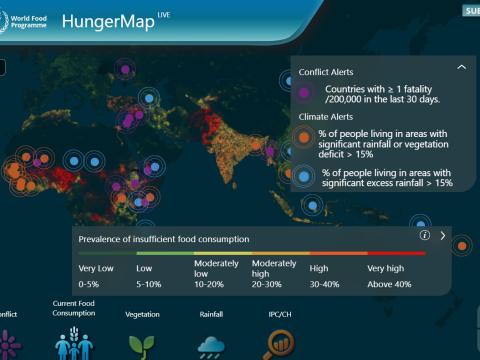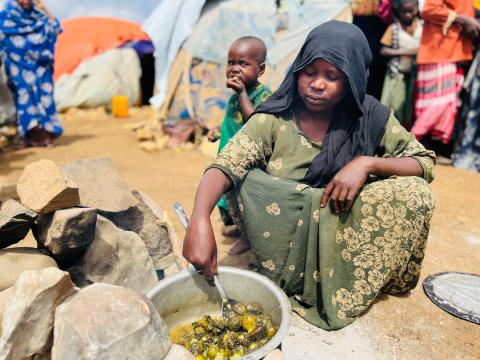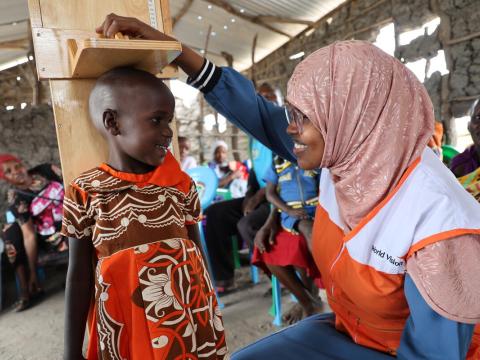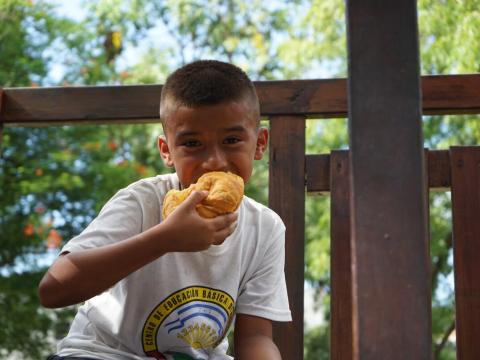
G20 Must Commit to Ending Hunger and Malnutrition
Dr Andrea Galante called on G20 leaders to do all they can to end "the most degrading of human deprivations"
The World Food Programme (WFP) recently updated its Hunger Map, a startling live graphic showing all the places where people live in daily hunger and malnutrition. It is colour-coded to reflect the areas of most extreme need, with regional updates showing the main drivers of this escalating humanitarian disaster.
The map shows us what many people already know but more people need to know; global hunger crisis has reached unprecedented proportions, driven by a combination of conflict, economic shocks, and climate change:
- In 2023, approximately 733 million people suffered from hunger (just over 9% globally)
- In 2023, 2.3 billion people – 28.9% of the global population – faced moderate or severe food insecurity, a number that has gone down since 2020.
- Among these people, over 864 million experienced severe food insecurity, going without food for an entire day or more.
All of these people are included in the UN’s Food & Agriculture Organization’s (FAO) annual Global Report on Food Security and Nutrition (2024), also known as the SOFI report.
SOFI 2024
The SOFI 2024 report highlights the confluence of crises affecting global food and nutrition. This November, World Vision is heading to the G20 summit with a mission to amplify both these two pressing issues and our proposals for action.
1) Persistent Hunger and Food Insecurity
Global hunger rates have remained stable since 2020, but the crisis is severe in many regions. In Africa, 58% of the population faces extreme food insecurity, and over 2.8 billion people could not afford a healthy diet in 2022. This situation demands immediate and comprehensive action to address hunger and food insecurity.
2) Nutrition Challenges
The report reveals troubling trends in nutrition, including rising obesity rates among adults and increasing anaemia among women aged 15-49. Despite improvements in childhood stunting and wasting, persistent nutrition issues require targeted interventions to ensure all individuals can achieve and maintain their full potential.
“Hunger is the most degrading of human deprivations”
These were the words used by Brazilian President Luiz Inácio Lula da Silva on 24 July, when he headed a Task Force of top-level G20 ministers, meeting for the pre-launch of the G20’s Global Alliance against Hunger and Poverty. The SOFI report’s launch in Brazil on 25 July comes just a day after the taskforce’s meeting.
G20 members represent about 80% of the world’s gross domestic product (GDP), 75% of international trade, two-thirds of the world’s population, and 60% of the land area. The G20 plays a crucial role in addressing global economic challenges. Their decisions have far-reaching impacts.
Hunger and poverty will be topping the agenda of November’s summit. As a platform committed to targeted policies, the Global Alliance Against Hunger and Poverty will use the G20 summit to connect countries with partners offering technical and financial support, including governments, philanthropic institutions, and research centres.
President Lula da Silva has shown he is fully committed to ending hunger and improving nutrition outcomes since 2003, when he created a national programme eradicate hunger. Since then, Brazil officially left the FAO’s “hunger map”, with an undernourishment rate below 2.5% for three years.
World Vision wants ENOUGH
World Vision International’s own ENOUGH Campaign to mobilise global efforts and resources towards ending hunger and malnutrition aligns perfectly with the Global Alliance Against Hunger. Both initiatives share the vision of eradicating food insecurity and ensuring access to nutritious diets for all, particularly for vulnerable populations.
World Vision at G20
At this G20 summit in Brazil, World Vision will advocate for key actions based on the SOFI report’s findings:
- Uninterrupted Food Assistance: Governments must ensure continuous food assistance for displaced populations to address immediate needs and prevent further crises.
- Increased Investment in Prevention and Preparedness: We call for enhanced funding for prevention, preparedness, and anticipatory actions to effectively tackle food security and nutrition challenges.
- Addressing Child Hunger and Malnutrition: Strong political will and cross-sector collaboration are essential to developing effective school meal programmes as key safety nets. Our goal is to ensure every child has access to nutritious school meals by 2030. This involves setting ambitious targets and engaging various stakeholders to achieve complete coverage in primary schools and extend benefits to secondary students, especially in low-income and conflict-affected regions.
Progress in combating global hunger has regressed by 15 years, with 733 million people facing hunger in 2023 — one in eleven globally and one in five in Africa. The UN report reveals that 63% of 119 low- and middle-income countries struggle with inadequate financing and severe food insecurity. To address this, donors need to provide reliable food assistance and boost investments in strategic preventive measures. This approach is crucial for improving data coordination, managing risks, and enhancing transparency, ultimately closing the financing gap and fortifying global food security efforts.
The full SOFI report can be found here.
Andrea Polo Galante is World Vision International’s Senior Policy Advisor on Food Security and Nutrition


